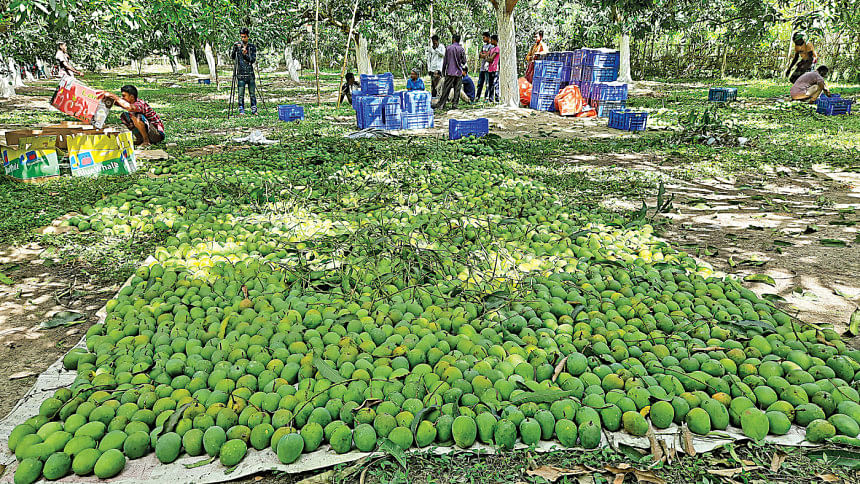Low prices dampen spirits of mango farmers

Mango farmers across the country, particularly in Rajshahi and Chapainawabganj, have been left disappointed by the lower prices for the 'King of Fruits' despite having secured very good yields this season.
Depending on varieties, mango prices are currently around Tk 1,100 to Tk 1,700 per maund (40 kilograms), down by Tk 600 to Tk 800 compared to the same period last year, according to traders and farmers. The ongoing restrictions on public movement could cost the industry about Tk 3,000 crore, they said.
Although vehicles carrying mangoes have been kept out of the purview of the restrictions, traders are reportedly being harassed while trying to transport the fruit, making them afraid of visiting the hubs.
In a bid to facilitate mango transportation, the government launched a special train dubbed the Mango Train from Chapainawabganj via Rajshahi to Dhaka. But the service is not enough to meet the huge demand, traders and farmers said.
The livelihoods of 300,000 farmers in the Rajshahi region alone and thousands of others involved in mango trading will be at stake if fair prices cannot be ensured.
As of Thursday, farmers are selling the Himsagar variety for Tk 1,400 to Tk 1,700 per maund.
Langra mangoes are priced at Tk 1,100 to Tk 1,400 per maund, Laxmanbhog at Tk 600, and Guti at Tk 400 to Tk 500 at the local wholesale markets, including Kansat Bazar of Chapainawabganj and Baneshwar Bazar in Rajshahi.
Local traders sell these mangoes to buyers from other districts at Tk 1,500 to Tk 1,800 per maund. However, these varieties are then sold at the wholesale markets in Dhaka, such as Karwan Bazar, for Tk 1,500 to Tk 2,200 per mound.
The price is Tk 50 to Tk 70 per kg at the retail level.
Md Salauddin, a farmer in Bagha upazila of Rajshahi, said after seeing a good yield of mango this season, he had dreamed of making a good profit, but the dream has broken because of the lower prices.
"Farmers are not getting fair prices in this peak season due to the absence of buyers in the local markets," he added.
Salauddin sold Tk 2 lakh worth of mangoes from his garden this year, down from Tk 3.5 lakh in 2020. Many farmers who have no direct link with traders in the country's major cities or access to online markets are being compelled to sell their stocks at lower prices fearing losses as the mangoes might remain unsold or rot.
Some farmers say they took mangoes to Dhaka after failing to sell them at local markets at a fair price. However, they still could not make an adequate profit despite paying transportation costs and market fees.
Yusuf Ali, a farmer and wholesaler in Chapainawabganj, said it is tough to send mangoes to Dhaka via the Mango Train, which carries the fruit just once a day, due to its tight schedule and booking procedure.
Kowsar Ali, a mango farmer and trader in Rajshahi, said the Mango Train service is cheaper than other services, but it is very difficult to get a booking due to its inadequate capacity.
"It costs only about Tk 80 to send one maund of mango on the special train, while it costs Tk 640 to send it by couriers," he added.
Ali Hossain, who suffered a loss in his restaurant business in Binodpur Bazar of Rajshahi amid the pandemic, said he bought mangoes from an orchard for Tk 80,000 but could not make a profit due to lower prices. Alamgir Mia, a farmer in Chapainawabganj, said his six-member family is dependent on selling mangoes.
"It will be difficult to manage my expenses this year as the price of mango is around 40 per cent lower than last year," he added.
Citing similar difficulties, many other farmers in the region express concerns over the lower prices despite the good yield.
Md Sorof Uddin, a senior scientific officer at the Horticulture Research Centre of the Bangladesh Agricultural Research Institute (BARI) in Gazipur, said the biggest problem is that buyers from Dhaka, Chattogram and other parts of the country were not able to travel to the region to buy mangoes because of the restrictions.
"So, mango growers are not getting fair prices," he said.
Another problem is that many mango-carrying vehicles face harassment, such as having their tyres punctured when returning after unloading a shipment.
"So, local administrations should take some steps to encourage the buyers and give them a clear message that no vehicle would be harassed if they come to buy mangoes," Uddin added.
Md Asadullah, director-general of the Department of Agricultural Extension (DAE), said as there were no major natural calamities like last year, mango yield has been good this year.
The DAE expects that 24 lakh tonnes of mangoes will be produced across the country this year. Last season, 24.68 lakh tonnes of mangoes were produced on 1.9 lakh hectares of land.
Around 8.52 lakh tonnes of mangoes are expected to be produced on 83,673 hectares of land in Natore, Naogaon, Rajshahi, and Chapainawabganj, according to DAE data. The region's mango production stood at 7.76 lakh tonnes last year.
Of the roughly 100 varieties of mangoes grown in the country, the top varieties include Gopalbhog, Laxmanbhog, Ranipasand, Himsagar, Langra, Fazli and Amrupali. Besides, the supply of Ashwina and BARI Mango-4 will begin from July 10.

 For all latest news, follow The Daily Star's Google News channel.
For all latest news, follow The Daily Star's Google News channel. 



Comments